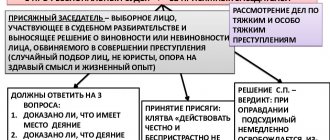KS: Seizure of property as evidence must be justified
On January 11, the Constitutional Court issued a ruling in the case of verifying the constitutionality of the provisions of Part 1 of Art. 81.1 and clause 3.1, part 2, art. 82 of the Code of Criminal Procedure of the Russian Federation. As AG previously reported, the reason for consideration was a complaint, according to which these norms do not provide for the procedure for seizing material evidence that is an instrument of crime in criminal cases in the economic sphere, in the manner prescribed by Art. 115 of the Code of Criminal Procedure of the Russian Federation.
As Mikhail Pustotin, lawyer of the Belgorod Region Administration of the Crimea, who represents the applicant’s interests, told AG, the reason for the appeal was that the equipment for the production of cigarettes belonging to Synclit was, by order of the investigator, included as material evidence in the criminal case initiated under paragraph “a” part 6 art. 117.1 Code of Criminal Procedure of the Russian Federation. The resolution states that the equipment served as a means of committing a crime and can serve as a means of detecting a crime and establishing the circumstances of a criminal case.
The company tried to appeal the actions of the department, in particular, Synclit insisted that the arrest of its property, attached to the case as material evidence, should have been carried out in accordance with Art. 115 of the Code of Criminal Procedure of the Russian Federation by court sanction. However, the court of first instance indicated that the investigator has the right, but not the obligation, to apply to the court with a petition for seizure. The appeal upheld this decision, adding that in accordance with Art. 115 of the Code of Criminal Procedure of the Russian Federation, the seizure of material evidence applies only to property obtained as a result of the commission of a crime, as follows from the provisions of clause 3.1. Part 2 Art. 82 of the Code of Criminal Procedure of the Russian Federation. The lawyer said that the courts of the first and second instances were guided by the current norms of the Code of Criminal Procedure of the Russian Federation, so the applicant decided not to appeal to the Supreme Court, but to ask the Constitutional Court of the Russian Federation to clarify the revealed uncertainty of the norms of the Code of Criminal Procedure.
In its decision, the Constitutional Court indicated that the seizure of property in a criminal case (including in the form of arresting it or recognizing it as material evidence with a storage regime limiting the rights of ownership and use of property) that is in the possession of persons who are not suspects or accused and who are not legally liable for the actions of the suspect, accused, and whose use in committing a crime is only expected, can only be of a temporary nature and applied when providing such persons with procedural guarantees for the protection of rights through justice that meets the requirements of fairness and equality.
At the same time, the Court emphasized that the institution of seizure and the institution of seizure and storage of material evidence have different purposes in criminal proceedings. The fact that the seizure of property as evidence and its retention during seizure on the basis of a court decision made at the request of an investigator or inquiry officer allows preliminary judicial control over their legality and validity to be extended to these relations does not predetermine the use of the procedure for seizure of property during in all cases when the relevant items are used as material evidence to solve a crime and resolve a criminal case, especially while ensuring the possibility of subsequent judicial control.
The withdrawal, in the opinion of the Constitutional Court, must be justified, including in the event of legal disputes on relevant issues. The responsibility for justification lies with the authorized persons of the preliminary investigation and inquiry bodies, and just a reference to the fact that the item has the properties of material evidence is not enough.
As the Constitutional Court of the Russian Federation recalled, in Resolution No. 9-P of July 16, 2008, it already noted that the court’s assessment of the legality and validity of the seizure from the owner or possessor of property in connection with its inclusion in a criminal case as material evidence cannot, within the meaning of Art. 81 and 82 of the Code of Criminal Procedure of the Russian Federation, be limited to establishing formal compliance with the law of the powers of the officials of the preliminary investigation bodies applying this measure. The court must come to the conclusion that it is impossible to solve the problems facing criminal proceedings in any other way.
In such cases, both the gravity of the crime in connection with the investigation of which the issue is being resolved and the characteristics of the property itself, including its value, significance for the owner or owner and society, as well as the possible negative consequences of the seizure of property, must be taken into account. Depending on the specified circumstances, the inquirer, investigator and then the court must determine whether this property is subject to seizure either in accordance with subparagraph. “a”, “b” clause 1, part 2, art. 82 of the Code of Criminal Procedure of the Russian Federation, it can be photographed, filmed or filmed and returned to the owner or possessor for storage until a decision is made in the criminal case.
The Constitutional Court emphasized that the seizure and retention as evidence in pre-trial proceedings in criminal cases of crimes in the sphere of economic activity of objects used in carrying out business activities and belonging to persons who are not suspects or accused in these criminal cases, or those who bear material responsibility for their actions would be limited disproportionately by constitutionally significant values by the right to private property. Moreover, if, to ensure the safety of such material evidence, their seizure is not required or their immediate return to the latter for safekeeping is allowed after the necessary investigative actions have been taken.
Thus, the Constitutional Court came to the conclusion that the contested provisions of the Code of Criminal Procedure of the Russian Federation do not contradict the Constitution in the constitutional and legal sense identified by this resolution. Decisions made in relation to are subject to review.
Commenting on the resolution of the Constitutional Court of the Russian Federation for AG, Mikhail Pustotin said that he regards it positively - in his opinion, it will put obstacles in the way of illegal actions of law enforcement agencies.
“The court explained the meaning of the provisions of the articles of the Code of Criminal Procedure that we disputed. This opinion is, in fact, the law and is expressed in the fact that it is impossible to confiscate, and if confiscated, then immediately return for safekeeping that property that is involved in the production cycle of persons who are not accused, suspected or legally liable for their action,” the lawyer said.
The lawyer noted that courts of general jurisdiction formally approach the consideration of issues of the validity of the seizure of property as evidence: “Does the investigator have the authority? Eat. They don’t go further into the essence of the problem itself.”
According to Mikhail Pustotin, this resolution is a suitable legal mechanism for all entrepreneurs, without exception, who have suffered to one degree or another from similar actions of law enforcement agencies. He noted that the Constitutional Court has quite clearly stated that such restrictions are not commensurate with other constitutional values, in particular, the right to work, to use one’s abilities for non-prohibited economic activity.
This is what Kirill Kavchenkov, a scientific consultant at the legal bureau Legal Choice, thinks: “It seems that both the Code of Criminal Procedure of the Russian Federation and the explanations of the higher courts are on the side of entrepreneurs: short deadlines have been established for the return of items that are not recognized as material evidence in economic cases, and the need to respect the interests of entrepreneurial communities. At the same time, when actually faced with such a problem, an entrepreneur is extremely limited in the tools of appeal: you can complain to the prosecutor’s office, a higher investigative body and the court. As law enforcement practice shows, all of the above authorities approach such complaints extremely formally, without going into the assessment of evidence at the pre-trial stage.”
In addition, the expert explained that in practice, business entities are faced with the arbitrariness of law enforcement agencies. “One of the forms of such arbitrariness is the seizure and long-term unjustified non-return of the property of individual entrepreneurs and legal entities, which is retained by the bodies of inquiry and investigation, which impedes the implementation of normal economic activities and leads to negative consequences in the form of losses and, often, bankruptcy,” he noted. .
However, according to Kirill Kavchenkov, the Constitutional Court left this issue without a specific decision, once again obliging both the courts and the investigation with the inquiry to maintain a balance of interests of the parties and to prevent violations of the rights of entrepreneurs. “So another point will appear in the form of a reference to this resolution in the complaints of competent lawyers,” the expert concluded.
Managing Partner of Zabeida and Partners Law Firm Alexander Zabeida believes that situations similar to the one faced by the complainant are not uncommon. He explained that an investigator or investigator, when investigating a criminal case, first of all cares about his own interests and the interests of the investigation (for example, the safety of material evidence), and secondly, about the interests of third parties whose rights are affected by the investigation.
According to Alexander Zabeyda, there are cases when the investigator does not have the opportunity to determine during an inspection of the crime scene whether he needs to seize equipment or not. “He could have made such a decision in consultation with a specialist or expert. But what if such a person does not participate in the investigative action, and it is not possible to ensure such participation in a short time? Of course, under such circumstances, the investigator will not take risks and will decide to seize the equipment. Therefore, from this point of view, the Constitutional Court is absolutely right,” explains the lawyer.
At the same time, he noted that it also happens that such criminal legal instruments are used by parties in business conflicts. “Any war is, first of all, money, that is, expenses. By depriving his opponent of a source of funds to carry out the procedural confrontation, an unscrupulous party can easily achieve the result he wants, which is what he takes advantage of in cases where the investigator or other person conducting the investigation manages to become corrupt,” concluded Alexander Zabeida.
The Commissioner for the Rights of Entrepreneurs in Custody, Alexander Khurudzhi, believes that the Constitutional Court of the Russian Federation has rightly recognized that items involved in criminal cases should not be confiscated from their owners if ensuring their safety and carrying out the necessary investigative actions with them do not require such confiscation. “In essence, with this decision he confirmed the compliance of the long-established practice with the Constitution. According to it, law enforcement agencies very often leave property seized in criminal (administrative) cases to the owners under their written obligation to ensure the safety of this property as material evidence until the court verdict comes into force,” the expert noted.
The expert notes that storing material evidence is a costly procedure, and in the event of seizure, the costs fall on the budget, so it is beneficial for law enforcement agencies to transfer such property to the owner. Refusals to return property to owners are very rare. “However, there are cases when seizure is used as a way to influence entrepreneurs for corrupt purposes. Regarding these aspects, it is more expedient to eliminate possible violations during the seizure of property to update reviews of law enforcement practice, addressed primarily to law enforcement officers, as well as to strengthen departmental and prosecutorial supervision over such procedural actions, since the largest number of violations during seizure do not occur in the courts.” “, concluded Alexander Khurudzhi.
The Supreme Court decided where to return the money for storing material evidence
Employees of the Ministry of Internal Affairs for the Voronezh region investigated a criminal case (No. 1-1/2017) about illegal tobacco production. In October 2015, investigators handed over the material evidence (machines and boxes of tobacco) for safekeeping to the victim OJSC Usman-Tabak. The society did not have any available premises, so it rented a warehouse. I had to pay 20,000 rubles a month for it. In March 2017, a verdict was passed in the case, the defendants were found guilty, but the issue of procedural costs was not resolved. And Usman-Tabak continued to store material evidence until December 2021. In total, the company had the machines for more than two years. During this time, the company paid 525,000 rubles. for renting a warehouse. The company decided to collect this money from the regional Ministry of Internal Affairs.
Who has jurisdiction over the dispute?
First, she filed a claim for damages in the Central District Court of Voronezh, but the proceedings were terminated due to the lack of jurisdiction of the dispute. Then the company appealed to the Arbitration Court of the Voronezh Region. The case was again dismissed for the same reason - lack of jurisdiction (case No. A14-26691/2018). The court indicated that if the issue of procedural costs was not resolved at the time of sentencing, then, at the request of interested persons, it is resolved by the same court.
The appeal overturned the decision and returned the case to the first instance. The court relied on the position of the Constitutional Court of 2005 (definition No. 367-O): issues of compensation for procedural costs not resolved in the established manner do not deprive society of the right to judicial protection in a civil case. The department tried to appeal this, but the cassation court agreed with the decision, and the Supreme Court refused to transfer the complaint to the board for consideration.
- Damaged material evidence: who is responsible for losses
June 5, 11:11 - Lawyer costs: procedural costs or damages
May 19, 12:02
In the “new circle” the defendant was replaced by the Ministry of Internal Affairs of Russia, and the company clarified its demands, reducing the amount of damages to 440,000 rubles. Upon re-examination, the first instance satisfied the claim in full. The appeal left the decision unchanged, but the district court had a different opinion and refused to satisfy the demands. The court decided that money for storing material evidence is a procedural cost and should be reimbursed in a criminal case according to the rules of the Code of Criminal Procedure.
Then Usman-Tabak OJSC complained to the Supreme Court. The society asked to cancel the decision of the district court, since the issue of resolving the dispute within the framework of civil proceedings was already the subject of consideration by the courts.
Kept because “the investigator begged”
The meeting in the Supreme Court took place on April 7, the trial was presided over by Supreme Court Judge Marina Pronina. Usman-Tabak lawyer Dmitry Allenykh and representative of the Ministry of Internal Affairs Andrey Kostin came to the Supreme Court. Allenykh said that to store evidence, he had to rent a room with an area of 100 square meters. m. Pronina clarified whether they could refuse storage and why they did not do this if there were no free premises. “The investigator begged very tearfully because there was no one else to keep,” Allenykh admitted.
– In accordance with the verdict, society is recognized as a victim. The verdict states that your right to satisfy a civil claim is recognized; the court writes: “Submit the issue of the amount of compensation for damage caused by the crime through civil proceedings.” Have you filed a claim? – asked Pronina.
- Yes, it was presented. But about the protection of exclusive rights to a trademark. The convicts were accused of counterfeiting cigarettes, the trademark of which belongs to Usman-Tabak,” Allenykh replied.
– What about legal costs? - Pronina clarified.
“We have not stated any legal costs,” said a representative of the company.
Kostin opposed him. He noted that the company applied to the Ramonsky District Court of the Voronezh Region with an application for reimbursement of costs in the criminal case (No. 4/17-14/2018). But then a representative of the society asked to return the application, and the proceedings in the case were stopped. He familiarized the trio of judges with a copy of the ruling.
Kostin continued that procedural costs should be reimbursed either from the convicted person or from the federal budget. This issue is resolved by the court in criminal proceedings. And according to paragraph 12 of the resolution of the Plenum of the Supreme Court No. dated December 19, 2013, if the issue is not resolved when the verdict is passed, then the same court returns to it at the request of interested parties. That is, Usman-Tabak had the right to go to court to resolve the issue of reimbursement of its expenses for storing material evidence, Kostin concluded.
Not to be treated as an economic dispute
According to a representative of the Ministry of Internal Affairs, if we assume that such a dispute is initially within the jurisdiction of arbitration courts, then there is no basis for collecting costs from the convicted person.
“By considering the case as an economic dispute, we actually release the convicted person from liability, and assign the responsibility for reimbursement of costs only to the federal budget,” said a representative of the Ministry of Internal Affairs.
“If we fix this situation in the ruling of the Supreme Court, then any organization that stores material evidence will not claim these costs in relation to the convicted person, but will immediately appeal to the arbitration courts. That is, the obligation to reimburse procedural costs will be assigned only to the federal budget,” Kostin explained his position.
Therefore, he asked the three judges to uphold the cassation decision, which refused to collect damages from the company. After this, the board retired to the deliberation room, and half an hour later Pronina read out the board’s decision: the cassation decision should be upheld.
The issue of compensation for procedural costs is not within the competence of the arbitration court, says Nikolai Polusitov, senior lawyer of the BA Bureau of Lawyers "De Jure" Bureau of Lawyers "De Jure" Federal rating. group Arbitration proceedings (medium and small disputes - mid market) group Bankruptcy (including disputes) (mid market) group Dispute resolution in courts of general jurisdiction group Family and inheritance law group Criminal law group Natural resources/Energy group Land law/Commercial real estate/Construction 8th place by number of lawyers 13th place by revenue per lawyer (more than 30 lawyers) 15th place by revenue Company profile. But he calls the cassation position only partly correct. The court did not take into account that Usman-Tabak did not demand compensation for procedural costs, but to recover damages. Since the company continued to store material evidence after the verdict, the money spent on rent from that moment on is a loss. That is, the claim of the Usman-Tabak company, as Polusitov believes, should have been partially satisfied. The expert concluded that the costs of storing material evidence themselves are not losses, and they must be recovered on the basis of a petition in the framework of other legal proceedings.
- Anastasia Sinchenkova
- Supreme Court of the Russian Federation
- Economy Board of the Armed Forces
How to return material evidence to the victim?
Four years ago, one of my friends donated $1,000,000 to the FSB for a test purchase. The verdict against the bribe extorter has been passed, but has not yet entered into legal force. Until this point, the money is kept in business and is not returned to the owner.
The second one - I bought a car, the documents for which turned out to be fake. As a result, the car was seized as evidence. He was put into custody. It was possible to pick it up through “unofficial means” when the body of the car began to become corroded.
And such problems often arise not from the accused, but from people who, due to circumstances, suffered at the hands of fraudsters or became victims of other crimes.
Indeed, according to the law, one or another object that is the target of a criminal attack, or a thing on which there are traces of a crime, automatically becomes material evidence in a criminal case. Such an item must be kept with the case until the end of its consideration by the court.
Without going into the intricacies of jurisprudence, I will briefly dwell on the position of the Supreme Court of the Russian Federation and the European Court of Human Rights, which speak about the inappropriateness of long-term storage of valuable items in a criminal case.
In other words, if an item can be described, photographed, and its properties are recorded, it must be returned to the owner. In addition, physical evidence can be returned to the owner after all the necessary forensic examinations have been carried out. That is, the money can be copied on a photocopier, and the banknote numbers can be copied, and the car can be sent for an examination, which will show whether its engine and body numbers have been changed or not. And if so, under what conditions?
As a matter of fact, there is also ordinary everyday logic in this, as well as the understanding that such objects are valuable for their owners.
In fact, everything happens with the exact opposite effect - cars rot in the parking lot, the seized money lies in the safe of the investigators. But they are not returned to the owners during the investigation. And these are not all examples.
Thus, the actions of the law enforcement system, which is designed to protect the legitimate interests primarily of citizens affected by crimes, contrary to all logic, are directed against these same citizens. Crimes, of course, are solved, and the perpetrators are held accountable, but during this time the victims are so tired that they almost unanimously say: “It would be better if I didn’t get involved with our justice.”
Appeals to the prosecutor's office or to the court in cases of such categories usually come down to replies stating that the investigator is an independent person and determines the course of the investigation. Sometimes, of course, the court points out that the investigator has violated the law, saying... “You have had the material evidence for a long time, why don’t you return it? Eliminate violations of the law immediately!!!” To which the investigation agrees and finds a bunch of other reasons why the material evidence should be in their possession: additional examinations are required, it is impossible to transport the car to an expert institution, the money has not passed additional checks, etc. and so on. In this case, the court cannot do anything special, since according to the law it is neutral and cannot interfere in the course of the investigation.
The reasons for this behavior of the investigative authorities are, in my opinion, that our criminal legal system currently lives “the old fashioned way”, and is not yet ready to accept the standards of American or European justice, where the rights of citizens, including the law property are of the highest value!
I advise you, dear readers, to approach transactions with money and valuable property with extreme caution, so as not to become victims of such problematic situations!
Finance Times Help:
Code of Criminal Procedure Article 96. Physical evidence
Material evidence is recognized as objects that served as instruments of a crime, or retained traces of a crime, or were the objects of criminal actions, as well as money and other valuables obtained by criminal means, and all other objects and documents that can serve as means of detecting a crime, establishing factual circumstances of the criminal case, identifying the perpetrators or refuting the accusation or mitigating the responsibility of the accused.
Article 97. Storage of material evidence
1. Physical evidence must be described in detail in the protocols of inspection and other investigative actions, if possible photographed and attached to the criminal case by a resolution (definition) of the body conducting the criminal process. Physical evidence must be kept in the criminal case and transferred along with it. 2. If items, due to their bulkiness or other reasons, cannot be stored in a criminal case, they must be photographed,, if possible, sealed and stored in a place designated by the body conducting the criminal proceedings. A sample of material evidence may be attached to the case. There must be a corresponding certificate about the location of the material evidence in the case. 3. Physical evidence is stored until the verdict enters into legal force or until the expiration of the period for appealing the decision or ruling to terminate criminal proceedings, but not more than three years. In cases where a dispute about the right to an object is subject to resolution through civil proceedings, material evidence is stored until the court decision enters into legal force. 4. In some cases, material evidence may be returned to their owners before the expiration of the deadlines specified in part three of this article, if this is possible without prejudice to the criminal proceedings. 5. Material evidence subject to rapid deterioration, if it cannot be returned to the owner, shall be handed over to the appropriate institutions for its intended use. If necessary, they may be replaced with items of the same kind and quality, or the owner may be paid their value. 6. When transferring a criminal case from an inquiry agency to an investigator, or from one inquiry agency to another inquiry agency, or from one investigator to another investigator, as well as when sending a case to a prosecutor or to a court, or when transferring a case from one court to another court, material evidence shall be forwarded together with the case, except for the cases provided for in parts two, four and five of this article.
Article 98. Measures taken in relation to material evidence when resolving a criminal case
In a verdict, ruling or resolution to terminate criminal proceedings, the issue of material evidence must be resolved. In this case: 1) the instruments of crime belonging to the accused are subject to confiscation or destruction; 2) items prohibited for circulation are subject to confiscation or destruction; 3) items that are of no value and cannot be used are subject to destruction, and in the event of a request from interested persons or institutions, they can be given to them; 4) money and other valuables acquired by criminal means, by a court verdict, are used to compensate for damage from the crime to the victim, another person, or are subject to confiscation. Other material evidence is given to its rightful owners, and if the latter are not identified, they are subject to confiscation. In case of a dispute about their ownership, it is subject to resolution through civil proceedings; 5) documents that are material evidence remain with the criminal case during the entire period of its storage or are transferred to interested persons or institutions.
The car was seized as evidence. How long will the case last, is there a deadline...
According to the Criminal Code of the Russian Federation:
Article 81. Physical evidence
1. Any items are recognized as material evidence:
1) who served as instruments of a crime or retained traces of a crime;
2) to which the criminal actions were directed;
2.1) money, valuables and other property obtained as a result of the commission of a crime;
(Clause 2.1 as amended by Federal Law dated July 27, 2006 N 153-FZ)
(see text in the previous edition)
3) other objects and documents that can serve as means for detecting a crime and establishing the circumstances of a criminal case.
2. The items specified in part one of this article,
are being examined
, are recognized as material evidence and are attached to the criminal case, about which a corresponding decision is made. The procedure for storing material evidence is established by this article and Article 82 of this Code.
3. When passing a sentence, as well as a ruling or resolution to terminate a criminal case, the issue of material evidence must be resolved. Wherein:
ConsultantPlus: note.
On the application of paragraph 1 of part three of Article 81, see Determinations of the Constitutional Court of the Russian Federation dated 07/08/2004 N 251-O, dated 03/24/2005 N 146-O.
1) the instruments of crime belonging to the accused are subject to confiscation, or transferred to the appropriate institutions, or destroyed;
2) items prohibited for circulation are subject to transfer to the appropriate institutions or are destroyed;
3) items that are of no value and not claimed by the party are subject to destruction, and in the event of a request from interested persons or institutions, they can be transferred to them;
4) money, valuables and other property received as a result of the commission of a crime, and income from this property are subject to return to the rightful owner;
(Clause 4 as amended by Federal Law dated July 27, 2006 N 153-FZ)
(see text in the previous edition)
4.1) money, valuables and other property specified in paragraphs “a” - “c” of part one of Article 104.1 of the Criminal Code of the Russian Federation are subject to confiscation in the manner established by the Government of the Russian Federation, except for the cases provided for in paragraph 4 of this part;
(clause 4.1 introduced by Federal Law dated July 27, 2006 N 153-FZ)
5) documents that are material evidence remain with the criminal case during the entire storage period of the latter or are transferred to interested parties at their request;
6) the remaining items are transferred to the legal owners, and if the latter are not identified, they become the property of the state. Disputes about the ownership of material evidence are resolved through civil proceedings.
4. Objects, including electronic media, and documents seized during pre-trial proceedings but not recognized as material evidence are subject to return to the persons from whom they were seized, taking into account the requirements of Article 6.1 of this Code.
Appeal the decision to attach the car to the criminal case in court. Since, according to the Code of Criminal Procedure of the Russian Federation:
Article 82. Storage of material evidence
1. Physical evidence must
stored
in a criminal case, before the verdict enters into legal force or before the expiration of the period for appealing the decision or ruling to terminate the criminal case and be transferred along with the criminal case, except for the cases provided for by this article. In the event that a dispute over the right to property, which is material evidence, is subject to resolution through civil proceedings, the material evidence is stored until the court decision comes into force.
2. Physical evidence in the form of:
1) items that, due to bulkiness or other reasons, cannot be stored in a criminal case, including large quantities of goods, the storage of which is difficult or the costs of providing special storage conditions for which are commensurate with their value:
a) are photographed or filmed, if possible sealed and stored in a place indicated by the inquiry officer or investigator. A document on the location of such material evidence is attached to the materials of the criminal case, and a sample of material evidence sufficient for a comparative study may also be attached;
b) are returned to their rightful owner, if this is possible without prejudice to evidence;
c) if it is impossible to ensure their storage in the ways provided for in subparagraphs “a” and “b” of this paragraph, they are assessed and, with the consent of the owner or by court decision, transferred for sale in accordance with the legislation of the Russian Federation in the manner established by the Government of the Russian Federation. The proceeds from the sale of material evidence are credited in accordance with this part to the deposit account of the body that made the decision to confiscate said material evidence for the period provided for in part one of this article. A sample of material evidence sufficient for a comparative study may be attached to the materials of the criminal case;
(clause “c” as amended by Federal Law dated April 22, 2010 N 62-FZ)
(see text in the previous edition)
1.1) large quantities of goods, the storage of which is difficult or the costs of providing special storage conditions for which are commensurate with their value, can be transferred for safekeeping to the owner;
(clause 1.1 introduced by Federal Law dated April 22, 2010 N 62-FZ)
2) perishable goods and products, as well as property subject to rapid obsolescence, the storage of which is difficult or the costs of providing special storage conditions for which are commensurate with their value:
a) are returned to their owners;
b) if it is impossible to return, they are assessed and, with the consent of the owner or by court decision, transferred for sale in accordance with the legislation of the Russian Federation in the manner established by the Government of the Russian Federation. The proceeds from the sale of material evidence are credited in accordance with this part to the deposit account of the body that made the decision to confiscate said material evidence for the period provided for in part one of this article. A sample of material evidence sufficient for a comparative study may be attached to the materials of the criminal case;
c) with the consent of the owner or by court decision, they are destroyed in the manner established by the Government of the Russian Federation, if such perishable goods and products have become unusable. In this case, a protocol is drawn up in accordance with the requirements of Article 166 of this Code;
(Clause 2 as amended by Federal Law dated April 22, 2010 N 62-FZ)
(see text in the previous edition)
3) ethyl alcohol, alcoholic and alcohol-containing products, narcotic drugs, psychotropic substances, plants containing narcotic drugs or psychotropic substances or their precursors, or their parts containing narcotic drugs or psychotropic substances or their precursors, as well as items seized from illegal trafficking long-term storage of which is dangerous to human life and health or to the environment, after carrying out the necessary research, are transferred for technological processing or destroyed by court decision in
ok
established by the Government of the Russian Federation, about which a protocol is drawn up in accordance with the requirements of Article 166 of this Code. A sufficient sample for comparative research of a narcotic drug, psychotropic substance, plant containing narcotic drugs or psychotropic substances or their precursors, or parts thereof containing narcotic drugs or psychotropic substances or their precursors, seized from illicit trafficking shall be attached to the materials of the criminal case;
(Clause 3 as amended by Federal Law dated July 11, 2011 N 195-FZ)
(see text in the previous edition)
3.1) money, valuables and other property received as a result of the commission of a crime, and income from this property discovered during investigative actions, are subject to arrest in the manner established by Article 115 of this Code;
(clause 3.1 as amended by Federal Law dated July 27, 2006 N 153-FZ)
(see text in the previous edition)
4) money and valuables seized during investigative actions, after their inspection and other necessary investigative actions:
a) are deposited with the financial division of the body that made the decision to seize the specified material evidence, or with a bank or other credit institution for the period provided for in part one of this article, except for the cases provided for in subparagraphs “b” and “c” of this paragraph;
b) can be stored in a criminal case if the individual characteristics of banknotes are important for proof;
c) are returned to their rightful owner, if this is possible without prejudice to evidence;
(clause 4 as amended by Federal Law dated December 6, 2011 N 408-FZ)
(see text in the previous edition)
5) electronic storage media:
a) are stored in a sealed form under conditions that exclude the possibility of unauthorized persons becoming familiar with the information contained on them and ensuring their safety and the safety of the specified information;
b) are returned to their rightful owner after inspection and other necessary investigative actions, if this is possible without prejudice to evidence.
(Clause 5 introduced by Federal Law dated July 28, 2012 N 143-FZ)
2.1. After urgent investigative actions are taken, if it is impossible to return electronic storage media seized during investigative actions to their legal owner, the information contained on these media is copied at the request of the legal owner of the seized electronic storage media or the owner of the information contained on them. Copying of this information onto other electronic media provided by the legal owner of the seized electronic media or the owner of the information contained on them is carried out with the participation of the legal owner of the seized electronic media or the owner of the information contained on them and (or) their representatives and a specialist in the presence of attesting witnesses. division of the preliminary investigation body or in court. When copying information, conditions must be provided that exclude the possibility of its loss or change. Copying information is not allowed if it may interfere with the investigation of a crime. Electronic storage media containing copied information are transferred to the legal owner of the seized electronic storage media or the owner of the information contained on them. A protocol is drawn up on the copying of information and the transfer of electronic media containing copied information to the legal owner of the seized electronic media or the owner of the information contained on them in accordance with the requirements of Article 166 of this Code.
(Part 2.1 as amended by Federal Law dated November 29, 2012 N 207-FZ)
(see text in the previous edition)
3. Other conditions for storage, recording and transfer of certain categories of material evidence are established by the Government of the Russian Federation.
4. In the cases provided for in subparagraph “b” of paragraph 1, paragraph 1.1, subparagraph “a” of paragraph 2, paragraphs 3.1 and 4, subparagraph “b” of paragraph 5 of part two and part two.1 of this article, the inquirer, investigator or judge makes a resolution.
(Part 4 as amended by Federal Law dated July 28, 2012 N 143-FZ)
(see text in the previous edition)
4.1. In the cases provided for in subparagraph “c” of paragraph 1, subparagraphs “b” and “c” of paragraph 2 and paragraph 3 of part two of this article, the investigator, with the consent of the head of the investigative body, or the investigator, with the consent of the prosecutor, initiates a corresponding petition before the court at the place of investigation, if the owner has not consented to the sale or destruction of the property.
(Part 4.1 introduced by Federal Law dated April 22, 2010 N 62-FZ)
5. When a criminal case is transferred by an inquiry body to an investigator or from one inquiry body to another or from one investigator to another, as well as when a criminal case is sent to a prosecutor or to a court, or when a criminal case is transferred from one court to another, material evidence is transferred along with the criminal case, for except in cases provided for in this article.
Call
Did the answer help you? Yes No






